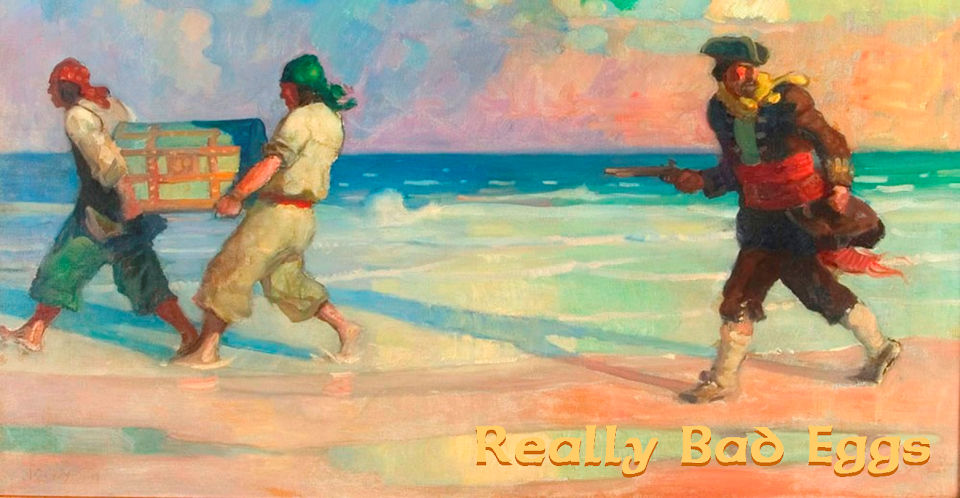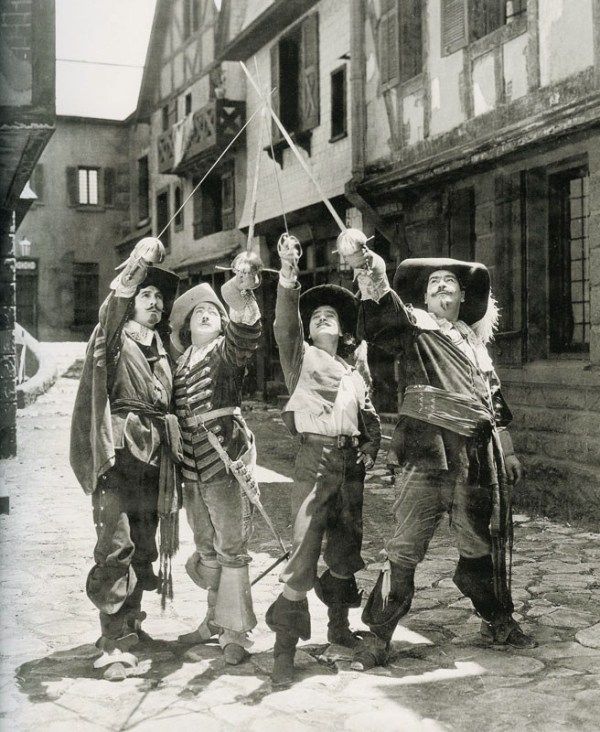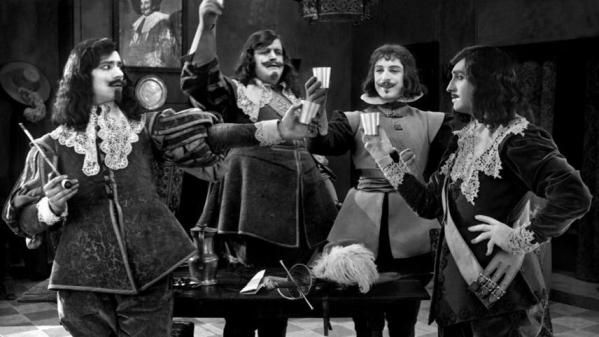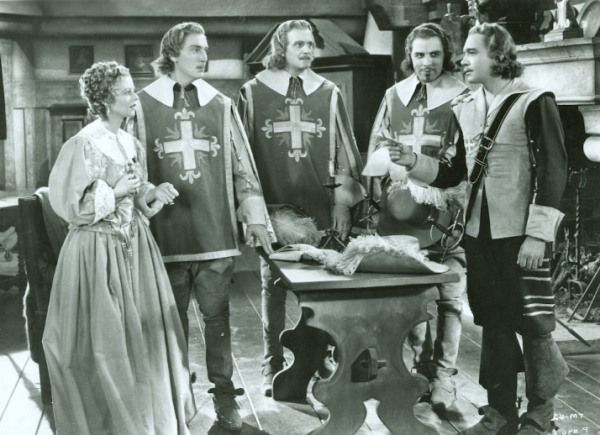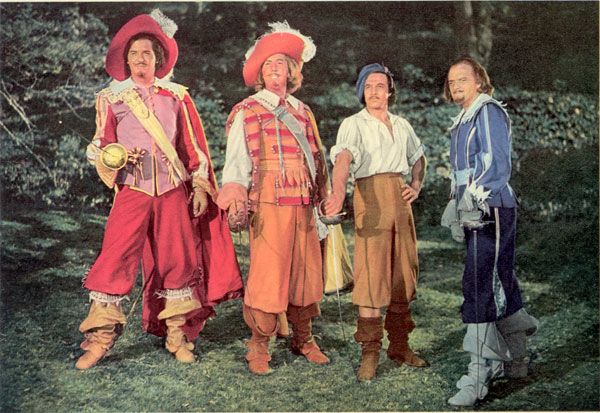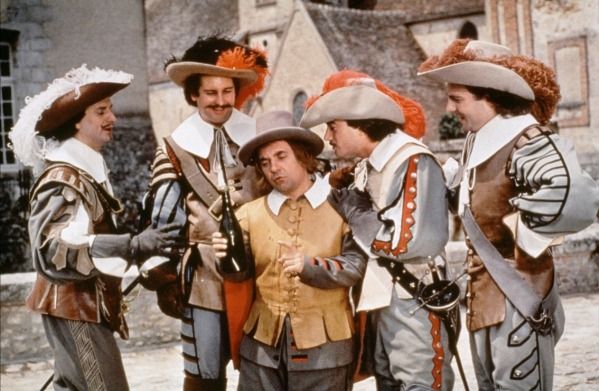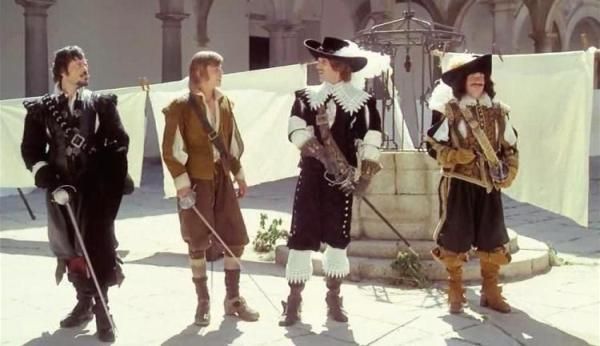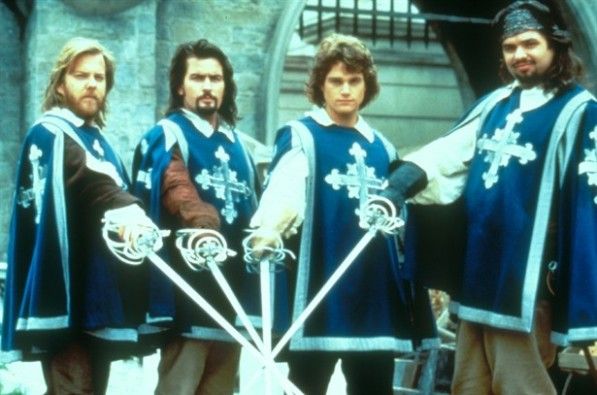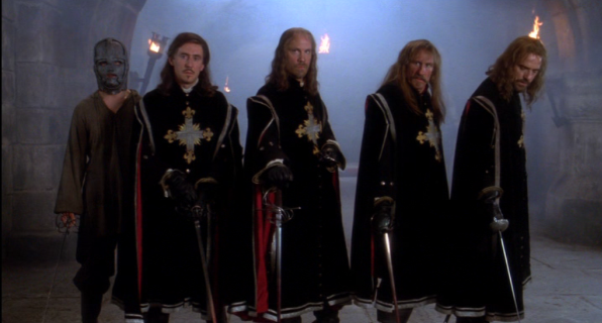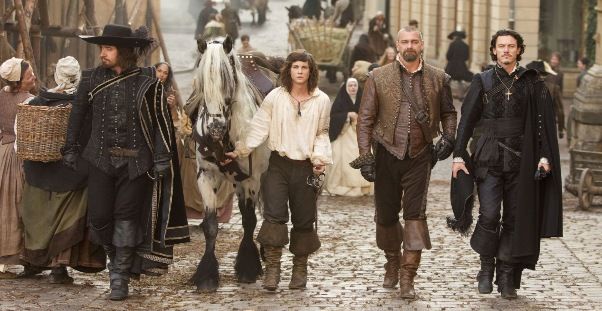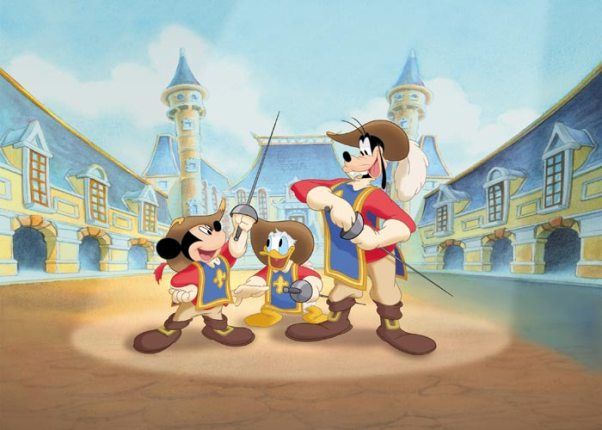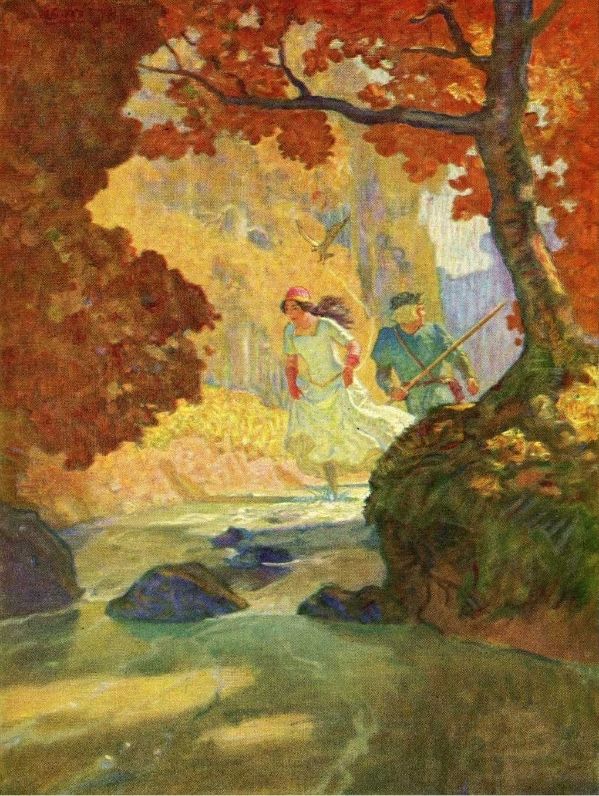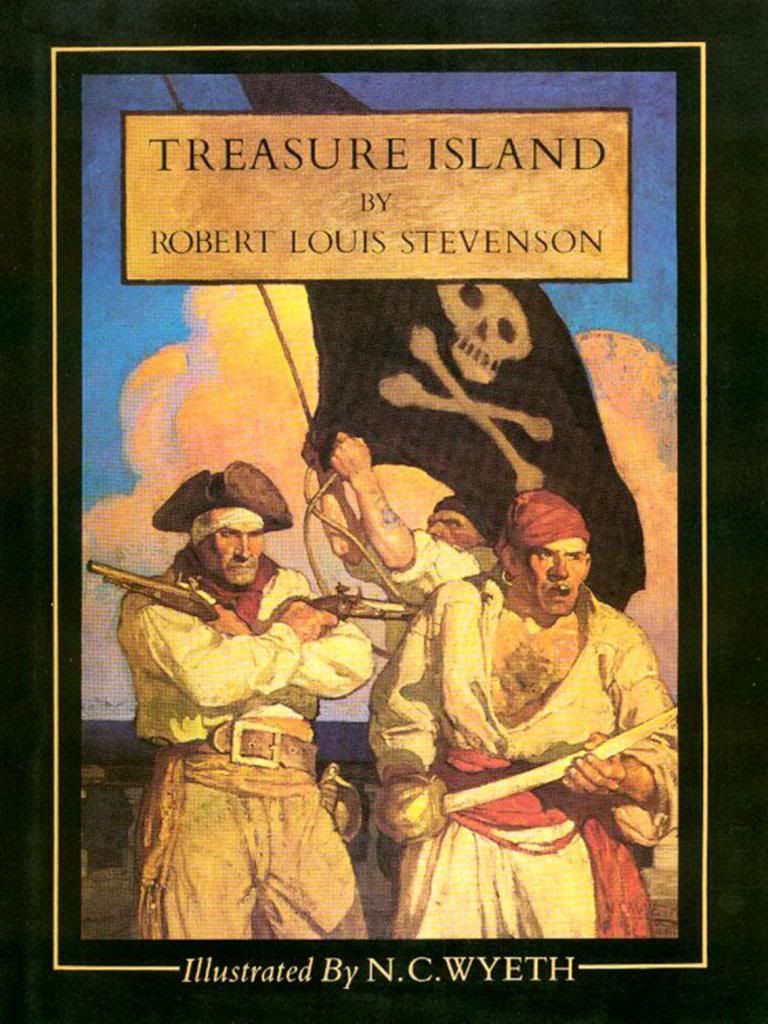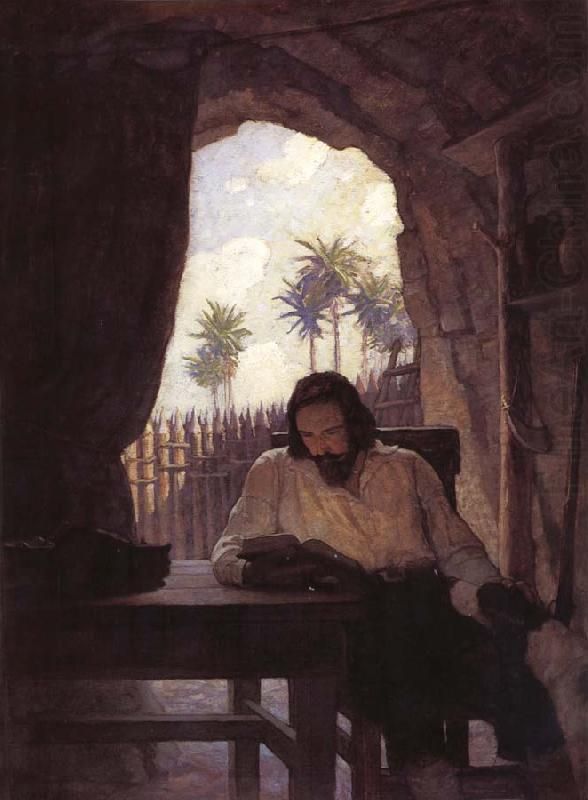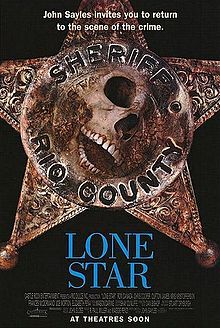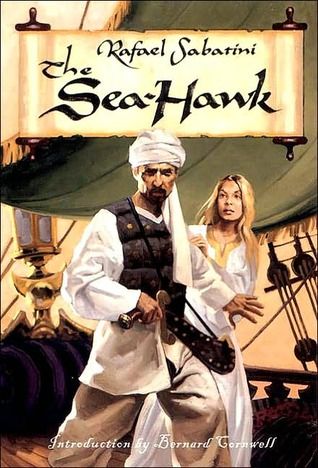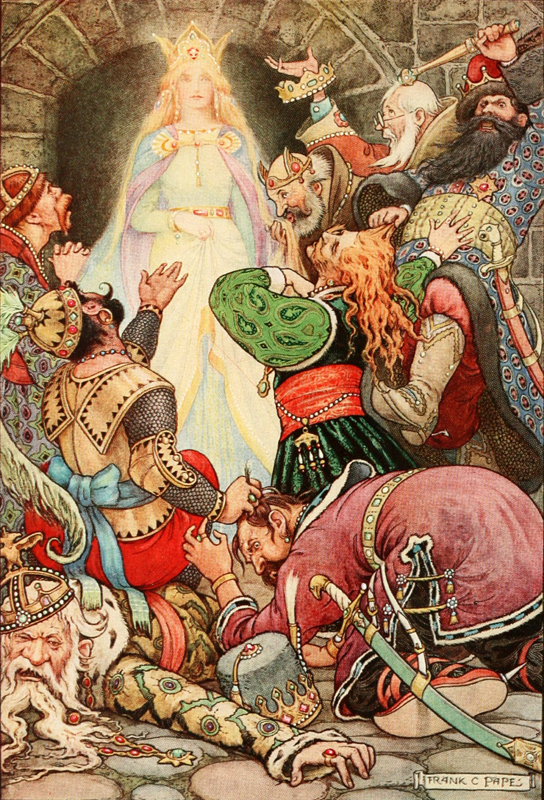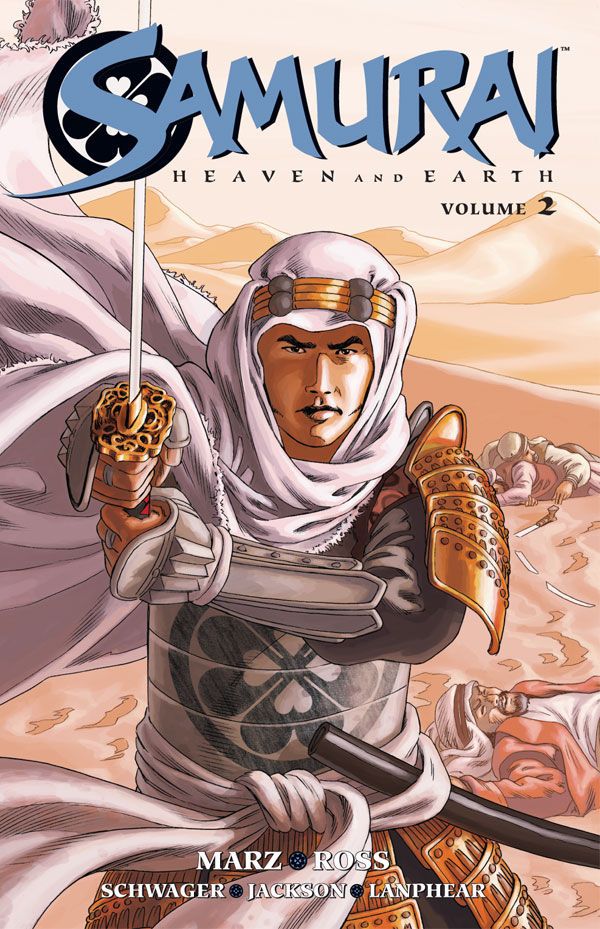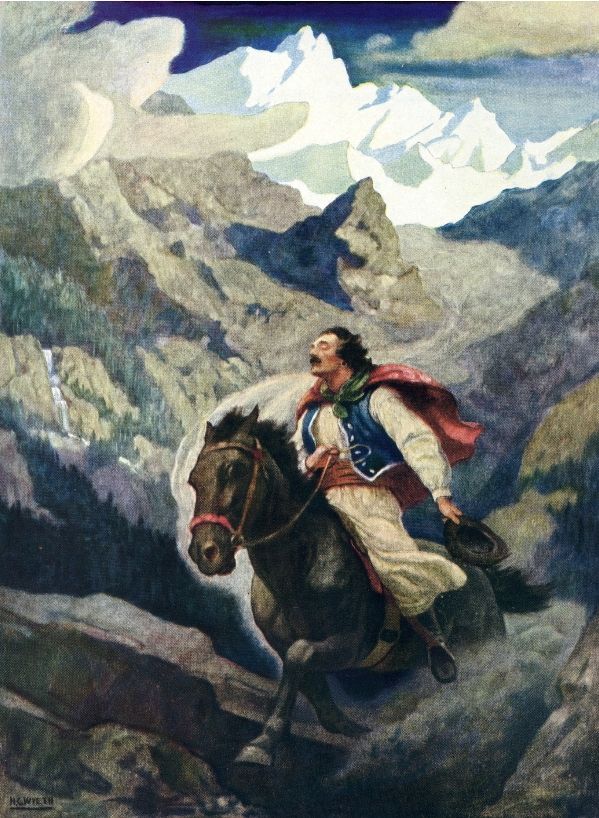Yesterday Tim Knight at HeroPress posted pictures of parties of fantasy adventurers as seen in different movies and televisions shows.
That got me thinking about some of the many different film versions of The Three Musketeers . . .
Les trois mousquetaires (1921)
The Three Musketeers (1921)
The Three Musketeers (1935)
The Three Musketeers (1948)
Les trois mousquetaires: Première époque - Les ferrets de la reine (1961)
The Three Musketeers (1973)
The Three Musketeers (1993)
The Man in the Iron Mask (1998)
The Three Musketeers (2011)
Oh, and, of course, I can't leave out these guys . . .
Mickey, Donald, Goofy: The Three Musketeers (2004)
Friday, May 31, 2013
Thursday, May 30, 2013
A World Lit Only By Fire
So, there I was, busily typing away at a blog post on Tuesday morning, when the power abruptly went out.
And stayed out for the next twenty-two hours.
A main line blew up, and a four-block radius didn't have electricity while SCE crews worked through the night to fix it. They got it back on late yesterday morning, then it was off again for about four hours late last night while they made some additional repairs.
Our electrical supply is always a little dicey; we get blackouts pretty consistently with the first big rain every winter, but they are usually just long enough to be annoying. This one was prolonged enough that we loaded up the fridge with bags of ice to keep dairy products from turning, and necessitated some cooking of now-defrosted meat from the freezer once the power was back on the next day.
For the kids it was an adventure, of course. Coming home after the Cabin Boy's baseball game and the Cabin Girl's dance rehearsal, we lit candles and dug out our battery-powered lanterns - we live in earthquake country, so this stuff's always close at hand - so they could take their baths and get ready for bed.

I soaked in the sensation of the room, of the constant motion of the shadows from the flickering candles, the strong scent of the burning wax, of the wavering waft of smoke from one candle that guttered out. I peeked outside and saw similar scenes in my neighbors' windows.
Without the distractions of our various media devices, my wife and I sat and talked for a solid hour. After she went to bad, I sat and read for awhile - by battery lantern, as my eyes aren't up to reading by candlelight.
Before electric lights and gas-lamps, the world was filled with shadows. Those big crystal chandeliers designed to suffuse a room with light were expensive and necessarily rare, and for most people it was the tiny light of candles and lamps that imperfectly kept back the darkness.
It was a good reminder that, when running a roleplaying game, the night is so much darker and quieter than the world we know. It would be hard to recognize friend from foe until they're close enough to manifest bad intention, and mistaken identity - or deliberate deception - is more likely in the shadows.
It's also a reminder of how people entertained themselves; they sang and told stories and gathered with friends. In the darkness, I considered calling a friend to see if he wanted to meet me at our local pub; remember, there's a reason 'you all begin in a tavern' makes perfect sense in many game-worlds.
For the Cabin Boy and Cabin Girl, the blackout was an adventure; for me, it was a reminder of what my world of adventure is really like.
And stayed out for the next twenty-two hours.
A main line blew up, and a four-block radius didn't have electricity while SCE crews worked through the night to fix it. They got it back on late yesterday morning, then it was off again for about four hours late last night while they made some additional repairs.
Our electrical supply is always a little dicey; we get blackouts pretty consistently with the first big rain every winter, but they are usually just long enough to be annoying. This one was prolonged enough that we loaded up the fridge with bags of ice to keep dairy products from turning, and necessitated some cooking of now-defrosted meat from the freezer once the power was back on the next day.
For the kids it was an adventure, of course. Coming home after the Cabin Boy's baseball game and the Cabin Girl's dance rehearsal, we lit candles and dug out our battery-powered lanterns - we live in earthquake country, so this stuff's always close at hand - so they could take their baths and get ready for bed.

I soaked in the sensation of the room, of the constant motion of the shadows from the flickering candles, the strong scent of the burning wax, of the wavering waft of smoke from one candle that guttered out. I peeked outside and saw similar scenes in my neighbors' windows.
Without the distractions of our various media devices, my wife and I sat and talked for a solid hour. After she went to bad, I sat and read for awhile - by battery lantern, as my eyes aren't up to reading by candlelight.
Before electric lights and gas-lamps, the world was filled with shadows. Those big crystal chandeliers designed to suffuse a room with light were expensive and necessarily rare, and for most people it was the tiny light of candles and lamps that imperfectly kept back the darkness.
It was a good reminder that, when running a roleplaying game, the night is so much darker and quieter than the world we know. It would be hard to recognize friend from foe until they're close enough to manifest bad intention, and mistaken identity - or deliberate deception - is more likely in the shadows.
It's also a reminder of how people entertained themselves; they sang and told stories and gathered with friends. In the darkness, I considered calling a friend to see if he wanted to meet me at our local pub; remember, there's a reason 'you all begin in a tavern' makes perfect sense in many game-worlds.
For the Cabin Boy and Cabin Girl, the blackout was an adventure; for me, it was a reminder of what my world of adventure is really like.
Thursday, May 23, 2013
Living History
Paul at Blog of Holding has a post about an ad in The Strategic Review for GDW's En Garde! today.
In the post, Paul mistakes Game Designers Workshop - the company which produced a wide range of board games and roleplaying games, including Traveller, Space: 1899, and Twilight: 2000, among many, many others - with Games Workshop, the miniatures, war games, roleplaying games, and White Dwarf publisher. A commenter quickly corrects the error.
isto I mention this not to highlight the error or the correction, but because it reminded me of something else. One of the many valuable functions of the roleplaying gamer blogoverse is to serve as a living archive of the knowledge and experiences of gamers, to record the facts and figures - like the difference between GDW and GW - but also more personal recollections of gamers, some of them collected over the course of decades.
Personal experience can be a slippery thing. 'The plural of anecdote isn't data' is a frequent admonition to those who attempt to extrapolate from their recollections to the whole of a population. There may be questions about an account's reliability, as a witness may deliberately or inadvertently shade the story. But oral history is a real thing and shouldn't be dismissed lightly. In large numbers, oral histories of individuals taken together can form a powerful and cohesive narrative, and one of the byproducts of blogging is to record that history.
I've had the impression over the years that some bloggers feel posts not devoted to actual play - be it something like a random table or an npc description to drop in during a game, or an adventure log - are a waste of time (see: Joesky tax). For my part, I appreciate hearing about how bloggers arrive at their conclusions, as well as the conclusions themselves, because they often reveal bits of their own history in the process, and by so doing enrich the living history of roleplaying games.
In the post, Paul mistakes Game Designers Workshop - the company which produced a wide range of board games and roleplaying games, including Traveller, Space: 1899, and Twilight: 2000, among many, many others - with Games Workshop, the miniatures, war games, roleplaying games, and White Dwarf publisher. A commenter quickly corrects the error.
isto I mention this not to highlight the error or the correction, but because it reminded me of something else. One of the many valuable functions of the roleplaying gamer blogoverse is to serve as a living archive of the knowledge and experiences of gamers, to record the facts and figures - like the difference between GDW and GW - but also more personal recollections of gamers, some of them collected over the course of decades.
Personal experience can be a slippery thing. 'The plural of anecdote isn't data' is a frequent admonition to those who attempt to extrapolate from their recollections to the whole of a population. There may be questions about an account's reliability, as a witness may deliberately or inadvertently shade the story. But oral history is a real thing and shouldn't be dismissed lightly. In large numbers, oral histories of individuals taken together can form a powerful and cohesive narrative, and one of the byproducts of blogging is to record that history.
I've had the impression over the years that some bloggers feel posts not devoted to actual play - be it something like a random table or an npc description to drop in during a game, or an adventure log - are a waste of time (see: Joesky tax). For my part, I appreciate hearing about how bloggers arrive at their conclusions, as well as the conclusions themselves, because they often reveal bits of their own history in the process, and by so doing enrich the living history of roleplaying games.
Wednesday, May 22, 2013
Tuesday, May 21, 2013
And Speaking of d20 Modern . . .
After a thirteen year hiatus from roleplaying games, I got interested again shortly after the release of 3e D&D. I was never much of a fantasy fan, but, like the Holmes blue box decades earlier, it was my gateway back into the hobby, and like my early experience with D&D, it was soon supplanted by something else I enjoyed much more: d20 Modern.
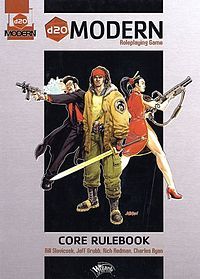
As with most games I played, I tinkered extensively with d20 Modern, developing a slew of house rules. Some where campaign specific; others were meant to be more broadly useful. I posted some of them in threads at EN World, and somehow, through all the various trials and tribulations of that site over the years, they're still there, unlike similar threads posted on the Whizbros forum which are now just memories.
I shelved d20 Modern when my personal 'old school renaissance' began, which included not only the realisation that the games I loved playing when I was younger were still just as playable now, but also the epiphany that I preferred purpose-built games to generic systems. As much as I love tinkering, sometimes it can be more work than seems worthwhile to kit-bash a generic game to get the campaign I want, as in my frustrated attempts at a Great Game campaign and a Zorro campaign, the latter using the execrable d20 Past.
That said, I don't know that I'm entirely done with d20 Modern. I don't tend to hang onto games I don't plan to play again - I lack a strong 'collector' instinct and I'd much rather ditch the dross - but I boxed up all my Modern books and stored them someplace dry.
That same impulse led me to track down those old house rules threads at EN World last week and start transferring them to a page of their own here on Blogger, beginning with a small collection of non-combat feats. I'll continue to transfer the old threads to that page as time allows. Just in case.

As with most games I played, I tinkered extensively with d20 Modern, developing a slew of house rules. Some where campaign specific; others were meant to be more broadly useful. I posted some of them in threads at EN World, and somehow, through all the various trials and tribulations of that site over the years, they're still there, unlike similar threads posted on the Whizbros forum which are now just memories.
I shelved d20 Modern when my personal 'old school renaissance' began, which included not only the realisation that the games I loved playing when I was younger were still just as playable now, but also the epiphany that I preferred purpose-built games to generic systems. As much as I love tinkering, sometimes it can be more work than seems worthwhile to kit-bash a generic game to get the campaign I want, as in my frustrated attempts at a Great Game campaign and a Zorro campaign, the latter using the execrable d20 Past.
That said, I don't know that I'm entirely done with d20 Modern. I don't tend to hang onto games I don't plan to play again - I lack a strong 'collector' instinct and I'd much rather ditch the dross - but I boxed up all my Modern books and stored them someplace dry.
That same impulse led me to track down those old house rules threads at EN World last week and start transferring them to a page of their own here on Blogger, beginning with a small collection of non-combat feats. I'll continue to transfer the old threads to that page as time allows. Just in case.
Monday, May 20, 2013
Fred Funcken 1921-2013
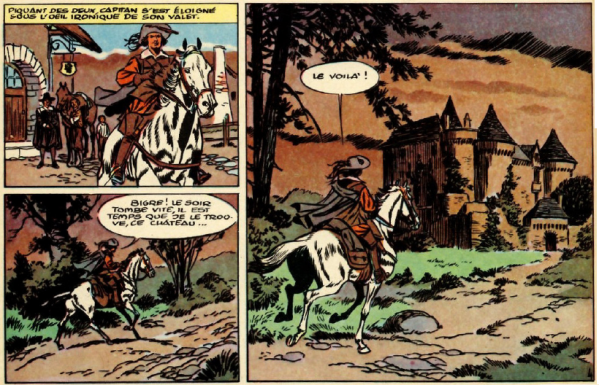
The blog Vintage Wargaming notes the passing of Belgian militaria historian and artist Fred Funcken. In addition to many historical books about uniforms and equipment, Fred and his wife Liliane were also noteworthy comic book writers and artists, including the adventures of the swashbuckling Capitan.
Capitan is a familiar character, a Gascon soldier who arrives in Paris during the regency of Marie de' Medici to seek his fortune, quickly finding himself in situations where he must defend the king from intrigues foreign and domestic, beginning with those of the nefarious Concini. The illustrations are outstanding in their period detail, and if the comics lack a certain visual dynamism more modern readers may expect, they more than make up for it with crackling adventures. Though difficult to find and available only in French to the best of my knowledge, they are well worth the effort to track down.
Sunday, May 19, 2013
The Pen and the Sword: Treasure Island
We were both of us capsized in a second, and both of us rolled, almost together, into the scuppers; the dead red-cap, with his arms still spread out, tumbling stiffly after us. So near were we, indeed, that my head came against the coxswain's foot with a crack that made my teeth rattle. Blow and all, I was the first afoot again; for Hands had got involved with the dead body. The sudden canting of the ship had made the deck no place for running on; I had to find some new way of escape, and that upon the instant, for my foe was almost touching me. Quick as thought, I sprang into the mizzen shrouds, rattled up hand over hand, and did not draw a breath till I was seated on the cross-trees.
I had been saved by being prompt; the dirk had struck not half a foot below me, as I pursued my upward flight; and there stood Israel Hands with his mouth open and his face upturned to mine, a perfect statue of surprise and disappointment. Now that I had a moment to myself, I lost no time in changing the priming of my pistol, and then, having one ready for service, and to make assurance doubly sure, I proceeded to draw the load of the other, and recharge it afresh from the beginning.
My new employment struck Hands all of a heap; he began to see the dice going against him; and, after an obvious hesitation, he also hauled himself heavily into the shrouds, and, with the dirk in his teeth, began slowly and painfully to mount. It cost him no end of time and groans to haul his wounded leg behind him; and I had quietly finished my arrangements before he was much more than a third of the way up. Then, with a pistol in either hand, I addressed him. "One more step, Mr. Hands," said I, "and I'll blow your brains out! Dead men don't bite, you know," I added, with a chuckle.
He stopped instantly. I could see by the working of his face that he was trying to think, and the process was so slow and laborious that, in my new-found security, I laughed aloud. At last, with a swallow or two, he spoke, his face still wearing the same expression of extreme perplexity. In order to speak he had to take the dagger from his mouth, but, in all else, he remained unmoved.
"Jim," says he, "I reckon we're fouled, you and me, and we'll have to sign articles. I 'd have had you but for that there lurch: but I don't have no luck, not I; and I reckon I'll have to strike, which comes hard, you see, for a master mariner to a ship's younker like you, Jim."
I was drinking in his words and smiling away, as conceited as a cock upon a wall, when, all in a breath, back went his right hand over his shoulder. Something sang like an arrow through the air; I felt a blow and then a sharp pang, and there I was pinned by the shoulder to the mast. In the horrid pain and surprise of the moment—I scarce can say it was by my own volition, and I am sure it was without a conscious aim—both my pistols went off, and both escaped out of my hands. They did not fall alone; with a choked cry, the coxswain loosed his grasp upon the shrouds, and plunged head first into the water.
- Treasure Island, Robert Louis Stevenson
I had been saved by being prompt; the dirk had struck not half a foot below me, as I pursued my upward flight; and there stood Israel Hands with his mouth open and his face upturned to mine, a perfect statue of surprise and disappointment. Now that I had a moment to myself, I lost no time in changing the priming of my pistol, and then, having one ready for service, and to make assurance doubly sure, I proceeded to draw the load of the other, and recharge it afresh from the beginning.
My new employment struck Hands all of a heap; he began to see the dice going against him; and, after an obvious hesitation, he also hauled himself heavily into the shrouds, and, with the dirk in his teeth, began slowly and painfully to mount. It cost him no end of time and groans to haul his wounded leg behind him; and I had quietly finished my arrangements before he was much more than a third of the way up. Then, with a pistol in either hand, I addressed him. "One more step, Mr. Hands," said I, "and I'll blow your brains out! Dead men don't bite, you know," I added, with a chuckle.
He stopped instantly. I could see by the working of his face that he was trying to think, and the process was so slow and laborious that, in my new-found security, I laughed aloud. At last, with a swallow or two, he spoke, his face still wearing the same expression of extreme perplexity. In order to speak he had to take the dagger from his mouth, but, in all else, he remained unmoved.
"Jim," says he, "I reckon we're fouled, you and me, and we'll have to sign articles. I 'd have had you but for that there lurch: but I don't have no luck, not I; and I reckon I'll have to strike, which comes hard, you see, for a master mariner to a ship's younker like you, Jim."
I was drinking in his words and smiling away, as conceited as a cock upon a wall, when, all in a breath, back went his right hand over his shoulder. Something sang like an arrow through the air; I felt a blow and then a sharp pang, and there I was pinned by the shoulder to the mast. In the horrid pain and surprise of the moment—I scarce can say it was by my own volition, and I am sure it was without a conscious aim—both my pistols went off, and both escaped out of my hands. They did not fall alone; with a choked cry, the coxswain loosed his grasp upon the shrouds, and plunged head first into the water.
- Treasure Island, Robert Louis Stevenson
Thursday, May 16, 2013
Dash and Glory
A recent thread on theRPGsite asks the question, "Karma, action points, extra dice/points are they a sign of a weak system[?].
I first ran into what John Kim calls "Hero Points" - "a type of mechanic where the player can spend from a limited supply of abstract points to gain successes on actions, cause background events, or perhaps manipulate the plot in other ways" - with Top Secret's Fame and Fortune points, which can be used to turn a fatal wound into a miss, a nice feature in a game with such a high potential for lethality as TS. Later I encountered them in d20 Modern, where Action Points are used to power certain class abilities or as a beneficial modifier to many combat and skill checks, and I really liked them in actual play - for me, they represented a character really 'bearing down' in an attempt to succeed, and like the best resource management rules, they presented the players with an interesting choice of when to spend them and when to hoard them against a future need.
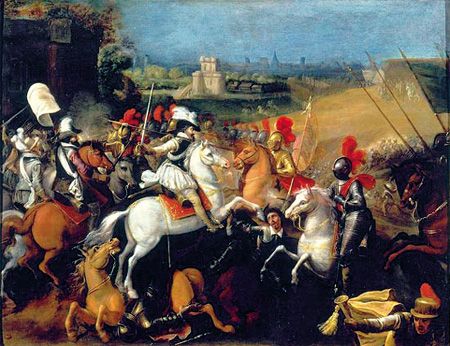
Lately I found myself revisiting that approach, though; re-reading John Kim's essay, I was reminded of the eponymous Hero Points from James Bond 007, which are received for rolling a critical success. The same rule would work with Flashing Blades, with a roll of 1 on 1D20 providing the player's character with a Panache point instead. This approach short-circuits attempts at players pandering to what they think the referee wants them to do. However, tthat's definitely not a problem with my current players, and honestly I can't think of too many players I've known over the years who would try to take advantage of such a rule; it seems more like one of those 'encountered mostly on the intrewebs' things rather than a real-world problem, at least in my own experience. With that in mind, I can't see why I shouldn't do both: allow a Panache point on any roll of 1 during a martial or non-martial skill check, or as a roleplaying bennie when the mood takes me or the other players.
There is one area of the game where Flashing Blades characters could definitely use a helping hand, and that's in rolls for openings and promotions in careers. The simplest solution would be to allow characters to use Panache points here as well - one rule to bind them all - but I liked the idea of a separate pool of points awarded not for swashbuckling antics but rather for fulfilling the character's professional obligations as well. This pool of points was named Gloire points, and they could be acquired, again at the referee's discretion, for doings something noteworthy in pursuit of that character's career. One Gloire point could be spent for each opening and promotion roll - when Riordan O'Neill recently had the opportunity to roll for promotion to ensign of the King's Musketeers, he spent both of his Gloire points to bump the two rolls necessary for him to gain rank.
Where Panache points represent a character devoting extraordinary effort or concentration to a task, Gloire points represent a favorable reputation which opens doors to opportunities.
And that brings me back to the RPGsite thread linked above. While most of the posters see them favorably, and not as a patch for "weak" games, a couple of gamers with whom I normally share similar outlooks on gaming are strongly opposed to 'Hero Points,' as described here.
More importantly, my experience of using them in actual play is that they're fun. They're fun to hand out, and they're fun to spend, and that's why I chose to add them to my campaign, and so far they've worked out great.
I first ran into what John Kim calls "Hero Points" - "a type of mechanic where the player can spend from a limited supply of abstract points to gain successes on actions, cause background events, or perhaps manipulate the plot in other ways" - with Top Secret's Fame and Fortune points, which can be used to turn a fatal wound into a miss, a nice feature in a game with such a high potential for lethality as TS. Later I encountered them in d20 Modern, where Action Points are used to power certain class abilities or as a beneficial modifier to many combat and skill checks, and I really liked them in actual play - for me, they represented a character really 'bearing down' in an attempt to succeed, and like the best resource management rules, they presented the players with an interesting choice of when to spend them and when to hoard them against a future need.

Lately I found myself revisiting that approach, though; re-reading John Kim's essay, I was reminded of the eponymous Hero Points from James Bond 007, which are received for rolling a critical success. The same rule would work with Flashing Blades, with a roll of 1 on 1D20 providing the player's character with a Panache point instead. This approach short-circuits attempts at players pandering to what they think the referee wants them to do. However, tthat's definitely not a problem with my current players, and honestly I can't think of too many players I've known over the years who would try to take advantage of such a rule; it seems more like one of those 'encountered mostly on the intrewebs' things rather than a real-world problem, at least in my own experience. With that in mind, I can't see why I shouldn't do both: allow a Panache point on any roll of 1 during a martial or non-martial skill check, or as a roleplaying bennie when the mood takes me or the other players.
There is one area of the game where Flashing Blades characters could definitely use a helping hand, and that's in rolls for openings and promotions in careers. The simplest solution would be to allow characters to use Panache points here as well - one rule to bind them all - but I liked the idea of a separate pool of points awarded not for swashbuckling antics but rather for fulfilling the character's professional obligations as well. This pool of points was named Gloire points, and they could be acquired, again at the referee's discretion, for doings something noteworthy in pursuit of that character's career. One Gloire point could be spent for each opening and promotion roll - when Riordan O'Neill recently had the opportunity to roll for promotion to ensign of the King's Musketeers, he spent both of his Gloire points to bump the two rolls necessary for him to gain rank.
Where Panache points represent a character devoting extraordinary effort or concentration to a task, Gloire points represent a favorable reputation which opens doors to opportunities.
And that brings me back to the RPGsite thread linked above. While most of the posters see them favorably, and not as a patch for "weak" games, a couple of gamers with whom I normally share similar outlooks on gaming are strongly opposed to 'Hero Points,' as described here.
For me, the difference isn't so much about the 'do over' or not nature of the mechanic but rather the relationship of the mechanic and how it is understood to work from an in-character POV.Now, I absolutely understand where Exploderwizard is coming from; a number of games I've seen use Hero Points in ways that are antithetical to how I approach roleplaying games, such as spending a point to gain a useful contact or a needed piece of equipment on the spot. At the same time, my sense of immersion isn't impeded by the use of something like Action Points, even if the connection between rationale for the benefit to the in-character action and the player's decision to spend the point may seem fairly tenuous.
A bennie or action point or whatever, has no meaning whatsoever to the character being played. It is a 4th wall mechanism that pulls you right out of first person roleplay every time you deal with it.
While perhaps not a 'weakness' in a strictly mechanical sense, such tools are antithetical to actually roleplaying a character ( unless that character is in fact a storyteller and not supposedly living the events happening in game.)
More importantly, my experience of using them in actual play is that they're fun. They're fun to hand out, and they're fun to spend, and that's why I chose to add them to my campaign, and so far they've worked out great.
Wednesday, May 15, 2013
Monday, May 13, 2013
My Game-World, by John Sayles
Surfing channels late Saturday night, I stumbed across John Sayles' Lone Star, and ended staying up way past my bedtime to watch the last hour or so of one of my all-time favorite movies.
Lone Star is a murder mystery, a character study, and a meditation on place, in this case, a Texas border town, where the discovery of a half-buried skeleton on an old Army rifle range re-opens the case of the 1957 disappearance of Charlie Wade, sheriff of Rio County. The story veers back and forth from 1957 to the present, with Sheriff Wade's dead hand reaching out to touch the lives of those living in Frontera, the county seat. Lone Star is powerfully acted by a splendid cast, delivered at a pace as measured as Chris Cooper's drawl, and ending with a gut-wrenching twist worthy of its Academy Award nomination for Best Original Screenplay.
And watching the movie into the early hours of Sunday morning, I was reminded of a conversation with one of my players over dinner awhile back. We were talking about my preparation for our Flashing Blades campaign. He explained that his D&D games tend to be largely improvised, with more of a focus on action than intrigue, and he was impressed by the depth of the machinations revealed in play so far. I told him that it was actually pretty easy for me - any time I created a non-player character, my first thoughts were always along the lines of, 'Okay, who's his brother? his sister? his uncle? his wife and his in-laws? What does he do for a living? who are his allies? his rivals? To what orgaisations does he belong? to what communities? In this way, I explained, conflicts and opportunities cascade out of the characters into the game-world, a flood of ideas on which to embellish.
John Sayles' Frontera, Texas, reminds me so much of how I build non-player characters that it's hard not to wonder if I was subliminally following his script in my head. Sheriff Sam Deeds, the present sheriff of Rio County, is the son of the legendary Buddy Deeds, who happened to be one of the deputies to the missing Charlie Wade and who possessed ample motive to want Wade dead; thus, Sam finds himself investigating the disappearance of Sheriff Wade by way of unexplored corners of his own past. Another of Charlie Wade's former deputies, Hollis Pogue, is now mayor of Frontera and a civic booster; he and others in Frontera are pushing for construction of a new county jail, a move opposed as a wasteful boondoggle by Sam. Hollis and Buddy both benefited from some shady land deals in the past; Mercedes Cruz, a prominent business woman and Fronter city council member, received money from Buddy which allowed her to start her successful restaurant. Sam is conflicted over their adoration of Buddy, a man both vstly corrupt and justly wise, particularly in the naming of the Frontera courthouse over the former sheriff. Mercedes' daughter, Pilar, is a teacher at the local high school, and both she and Sam have their own reasons to dislike Buddy, after their budding relationship was broken up by Buddy, ostensibly over the fact that Sam is white and Pilar a Latina.
There is a local army base commander whose estranged father owns a bar catering to the small African-American community of Frontera, the Latino undersheriff who plans to run stand for sheriff in the next election, and on and on, characters woven into the setting and through one another in surprising ways which the movie reveals strand by strand.
This is the same approach I use to creating characters for my settings, and I've found it to be particularly appropriate to swashbuckling campaigns, considering how little separation exists between the personal and the professonal in the Early Modern world, where family relationships and personal connections are as integral influence and status as offices and titles. Lone Star provides an excellent primer on how to fit these relationships together to build a game-world filled with intrigue.
Lone Star is a murder mystery, a character study, and a meditation on place, in this case, a Texas border town, where the discovery of a half-buried skeleton on an old Army rifle range re-opens the case of the 1957 disappearance of Charlie Wade, sheriff of Rio County. The story veers back and forth from 1957 to the present, with Sheriff Wade's dead hand reaching out to touch the lives of those living in Frontera, the county seat. Lone Star is powerfully acted by a splendid cast, delivered at a pace as measured as Chris Cooper's drawl, and ending with a gut-wrenching twist worthy of its Academy Award nomination for Best Original Screenplay.
And watching the movie into the early hours of Sunday morning, I was reminded of a conversation with one of my players over dinner awhile back. We were talking about my preparation for our Flashing Blades campaign. He explained that his D&D games tend to be largely improvised, with more of a focus on action than intrigue, and he was impressed by the depth of the machinations revealed in play so far. I told him that it was actually pretty easy for me - any time I created a non-player character, my first thoughts were always along the lines of, 'Okay, who's his brother? his sister? his uncle? his wife and his in-laws? What does he do for a living? who are his allies? his rivals? To what orgaisations does he belong? to what communities? In this way, I explained, conflicts and opportunities cascade out of the characters into the game-world, a flood of ideas on which to embellish.
John Sayles' Frontera, Texas, reminds me so much of how I build non-player characters that it's hard not to wonder if I was subliminally following his script in my head. Sheriff Sam Deeds, the present sheriff of Rio County, is the son of the legendary Buddy Deeds, who happened to be one of the deputies to the missing Charlie Wade and who possessed ample motive to want Wade dead; thus, Sam finds himself investigating the disappearance of Sheriff Wade by way of unexplored corners of his own past. Another of Charlie Wade's former deputies, Hollis Pogue, is now mayor of Frontera and a civic booster; he and others in Frontera are pushing for construction of a new county jail, a move opposed as a wasteful boondoggle by Sam. Hollis and Buddy both benefited from some shady land deals in the past; Mercedes Cruz, a prominent business woman and Fronter city council member, received money from Buddy which allowed her to start her successful restaurant. Sam is conflicted over their adoration of Buddy, a man both vstly corrupt and justly wise, particularly in the naming of the Frontera courthouse over the former sheriff. Mercedes' daughter, Pilar, is a teacher at the local high school, and both she and Sam have their own reasons to dislike Buddy, after their budding relationship was broken up by Buddy, ostensibly over the fact that Sam is white and Pilar a Latina.
There is a local army base commander whose estranged father owns a bar catering to the small African-American community of Frontera, the Latino undersheriff who plans to run stand for sheriff in the next election, and on and on, characters woven into the setting and through one another in surprising ways which the movie reveals strand by strand.
This is the same approach I use to creating characters for my settings, and I've found it to be particularly appropriate to swashbuckling campaigns, considering how little separation exists between the personal and the professonal in the Early Modern world, where family relationships and personal connections are as integral influence and status as offices and titles. Lone Star provides an excellent primer on how to fit these relationships together to build a game-world filled with intrigue.
Sunday, May 12, 2013
The Pen and the Sword: The Sea-Hawk
"What have you to say, you renegade dog?" Sir John demanded.
"This, Sir John, that unless you order your men back aboard your ship, and make oath to desist from this encounter, I'll take you straight down to hell with us at once. I'll heave this lantern into the powder here, and we sink and you come down with us held by your own grappling hooks. Obey me and you shall have all that you have come to seek aboard this vessel. Mistress Rosamund will be delivered up to you."
Sir John glowered upon him for a moment from the poop. Then -
"Though not prepared to make terms with you," he announced, "yet I will accept the conditions you impose, but only provided I have all indeed that I am come to seek. There is aboard this galley an infamous renegade hound whom I am bound by my knightly oath to take and hang. He, too, must be delivered up to me. His name was Oliver Tressilian.
Instantly, unhesitatingly, came the answer -
"Him, too, will I surrender to you on your sworn oath that you will then depart and do here no further hurt."
Rosamund caught her breath, and clutched Sakr-el-Bahr's arm, the arm that held the lantern.
"Have a care, mistress," he bade her sharply, "or you will destroy us all."
- The Sea-Hawk, Raphael Sabatini
"This, Sir John, that unless you order your men back aboard your ship, and make oath to desist from this encounter, I'll take you straight down to hell with us at once. I'll heave this lantern into the powder here, and we sink and you come down with us held by your own grappling hooks. Obey me and you shall have all that you have come to seek aboard this vessel. Mistress Rosamund will be delivered up to you."
Sir John glowered upon him for a moment from the poop. Then -
"Though not prepared to make terms with you," he announced, "yet I will accept the conditions you impose, but only provided I have all indeed that I am come to seek. There is aboard this galley an infamous renegade hound whom I am bound by my knightly oath to take and hang. He, too, must be delivered up to me. His name was Oliver Tressilian.
Instantly, unhesitatingly, came the answer -
"Him, too, will I surrender to you on your sworn oath that you will then depart and do here no further hurt."
Rosamund caught her breath, and clutched Sakr-el-Bahr's arm, the arm that held the lantern.
"Have a care, mistress," he bade her sharply, "or you will destroy us all."
- The Sea-Hawk, Raphael Sabatini
Friday, May 10, 2013
Ray Harryhausen, 1920-2013
While many gamers were introduced to fantasy through The Lord of the Rings or Conan the Barbarian - of He-Man and the Masters of the Universe - my introduction was through Sinbad. I had a picture book and record album with tales of Sinbad, and for an hour I would sit and listen to the recorded voice of Shaharazade telling the tales, turning the pages at the sound of a gong. Later The Arabian Nights - the Scribner's version with the Maxfield Parrish illustrations - would take the place of that picture book, but in between came The Golden Voyage of Sinbad.
TGVoS remains the most influential fantasy film for me. I watched it, mouth-open in wonder, drinking in every detail, and a few years later - and it was only a few years later - when I was introduced to Dungeons & Dragons, it was Sinbad, and especially TGVoS, from which I drew heavily for the dusty tombs and haunted caverns and wicked sorcerers and hissing monsters which populated my early dungeons.
In the spirit of this blog, and in honor of a cinematic magician, the duel with the skeleton from T7VoS.
TGVoS remains the most influential fantasy film for me. I watched it, mouth-open in wonder, drinking in every detail, and a few years later - and it was only a few years later - when I was introduced to Dungeons & Dragons, it was Sinbad, and especially TGVoS, from which I drew heavily for the dusty tombs and haunted caverns and wicked sorcerers and hissing monsters which populated my early dungeons.
In the spirit of this blog, and in honor of a cinematic magician, the duel with the skeleton from T7VoS.
Thursday, May 9, 2013
Osprey Publishing: French Musketeer 1622-1775
O, Osprey Publishing, how do I love thee?
Coming this July, to Osprey's Warrior line, is French Musketeer 1622-1775.
Looks like I'll have to read Matchlock Musketeer again a few times, to tide me over 'til July.
The works of French novelist Alexandre Dumas have been reproduced time and again on stage and screen. Based on a genuine memoir by an officer named D’Artagnan, Dumas published The Three Musketeers. The King’s Musketeers were formed in 1622 and were populated by young men of noble birth, but often of poorer means. The Musketeers served as a form of military academy, which enabled these men to qualify for commission into the regular army, but the academy was not just a schoolroom - the Musketeers served in all major battles and campaigns of the period; their reputation for bravery was well deserved. This title explores the history behind the legends created by Dumas. Drawing on historical and fascinating accounts the truth of this most colourful and flamboyant of units is revealed.I'm s huge fan of Osprey Publishing, with something like a hundred titles in my book collection. Though focused on militaria, the slim books are also social histories, with a wealth of period detail; this is particularly true of the Warrior series, which go into greater depth than the more broadly-focused Man-at-Arms books.
Looks like I'll have to read Matchlock Musketeer again a few times, to tide me over 'til July.
Wednesday, May 8, 2013
Letters to Isabel, Redux
Marcello recounts a game played by the adventurers in his latest missive to his dear Isabel.
I love this, integrating another game played by the players into the context of their characters and the game-world, in this case the board game The Resistance. It's one of those things I've done for many years, and it never ceases to make for a fun game-day.
Added bonus: The campaign now has an Obsidian Portal wiki going for it.
I love this, integrating another game played by the players into the context of their characters and the game-world, in this case the board game The Resistance. It's one of those things I've done for many years, and it never ceases to make for a fun game-day.
Added bonus: The campaign now has an Obsidian Portal wiki going for it.
Tuesday, May 7, 2013
Graphic Novels Challenge: Samurai: Heaven and Earth, Vol. 2
Continuing the story of Shiro and Yoshiko begun in Volume 1, Samurai: Heaven and Earth's second collected volume follows the samurai pursuing Yoshiko from France to the Mahgreb and then across North Africa to Egypt after she is abducted - yet again - this time by a Spanish nobleman.
It's hard to escape the feeling that the whole purpose of this exercise is nothing more than an excuse to illustrate Yoshiko in a French gown and a harim girl's outfit, continuing the Japan-o-philia of the first volume, and indeed the artwork continues to be magnificent. I found myself struggling to remain interested - in the story, in the characters - particulaly while navigating the gaping plot holes. I mean, it's not like I was expecting With Fire and Sword here, but is it really asking too much for characters who are more than skillfully rendered cardboard cut-outs? I honestly had no stake in finding out if Shiro and Yoshiko would manage to be together in the end, and the last score of pages was a wearying plod to the end.
This seems to me like another lost opportunity. If Ron Marz was so desperate to tell the story of a samurai in Early Modern Europe, how 'bout using Hasekura Tsunenaga as a starting point, instead of this brutally contrived and ultimately unengaging attempt?
Monday, May 6, 2013
Swashbucklers on the Telly
Bayuca is the blog I hope RBE grows up to be someday - it's consistently one of my favorite reads on the intrewebs.
Today's post (in Spanish) contains some exciting news for fans of swashbucklers, with no less than four series in development for television: BBC is producing a new The Three Musketeers series for 2014: Starz is working on Black Sails, a prequel of sorts to Treasure Island featuring the exploits of Captain Flint and his crew, also for 2014; NBC is producing Crossbones, another pirate series; and a Captain Alatriste series is being prepared in Spain, with anticipated release in other countries as well.
I think I'm gonna need to upgrade my DVR.
Today's post (in Spanish) contains some exciting news for fans of swashbucklers, with no less than four series in development for television: BBC is producing a new The Three Musketeers series for 2014: Starz is working on Black Sails, a prequel of sorts to Treasure Island featuring the exploits of Captain Flint and his crew, also for 2014; NBC is producing Crossbones, another pirate series; and a Captain Alatriste series is being prepared in Spain, with anticipated release in other countries as well.
I think I'm gonna need to upgrade my DVR.
Sunday, May 5, 2013
The Pen and the Sword: Captain Alatriste
It was clear that the Italian was doing very well. He could have killed the wounded man any number of times, but he was satisfied to harass him with false lunges and feints, as though he were enjoying delaying the thrust home. He resembled a thin black cat toying with a mouse before sinking its claws into it. At his feet, knee on the ground and back against the wall, one hand clutching the wound bleeding through his clothing, the younger Englishman was trying not to faint, and barely parrying his adversary's attacks. He did not ask for mercy; instead, his face, mortally pallid, showed dignified determination; his teeth were clenched, and he was resolved to die without crying out or moaning.
"Leave off!" Alatriste shouted to the Italian. Between thrusts, the captain's cohort looked at him, surprised to see him beside the second Englishman, who was disarmed and still standing. The attacker hesitated an instant, looked back at his subjected opponent, made a halfhearted feint, and again looked toward the captain.
"Is that a jest?" he asked, stepping back to catch his breath, as he whipped his sword through the air right and left.
"Leave off," Alatriste insisted.
The Italian stared at him open-mouthed, unable to believe what he just heard. In the dying light of the lantern, his pockmarked face looked like the surface of the moon. His black mustache twisted into a sinister smile, revealing his gleaming white teeth.
"Don't fuck this up now," the Italian said finally.
Alatriste too one step toward him, and the Italian looked at the sword in his hand. On his knee, uncomprehending, the wounded youth shifted his eyes from one to the other.
"There is more to this than we thought," the captain stated. "So we will kill them another day."
The Italian stared even harder. His smile grew wider and more incredulous, then disappeared. He shook his head.
"You are mad," he said. "This could cost us our necks."
"I will take the responsibility."
"So?"
The Italian seemed to be thinking it over. Then, with the speed of a comet, he lunged at the Englishman with a thrust so forceful that had Alatriste not blocked his sword it would have pinned the youth to the wall.
- Arturo Pérez-Reverte, Captain Alatriste
"Leave off!" Alatriste shouted to the Italian. Between thrusts, the captain's cohort looked at him, surprised to see him beside the second Englishman, who was disarmed and still standing. The attacker hesitated an instant, looked back at his subjected opponent, made a halfhearted feint, and again looked toward the captain.
"Is that a jest?" he asked, stepping back to catch his breath, as he whipped his sword through the air right and left.
"Leave off," Alatriste insisted.
The Italian stared at him open-mouthed, unable to believe what he just heard. In the dying light of the lantern, his pockmarked face looked like the surface of the moon. His black mustache twisted into a sinister smile, revealing his gleaming white teeth.
"Don't fuck this up now," the Italian said finally.
Alatriste too one step toward him, and the Italian looked at the sword in his hand. On his knee, uncomprehending, the wounded youth shifted his eyes from one to the other.
"There is more to this than we thought," the captain stated. "So we will kill them another day."
The Italian stared even harder. His smile grew wider and more incredulous, then disappeared. He shook his head.
"You are mad," he said. "This could cost us our necks."
"I will take the responsibility."
"So?"
The Italian seemed to be thinking it over. Then, with the speed of a comet, he lunged at the Englishman with a thrust so forceful that had Alatriste not blocked his sword it would have pinned the youth to the wall.
- Arturo Pérez-Reverte, Captain Alatriste
Friday, May 3, 2013
Musketeers in Black
MIB 1625: "Swashbuckling investigators of the paranormal battle aliens, conspiracies, and the Cardinal's Guards in Paris, circa 1625."
This manages to make 7th Sea's metaplot look reasonable.
I followed the link to "Rondak's Portal," hoping to find an actual play log or something, but no joy. Too bad.
This manages to make 7th Sea's metaplot look reasonable.
I followed the link to "Rondak's Portal," hoping to find an actual play log or something, but no joy. Too bad.
Thursday, May 2, 2013
"Building a Stronghold"
Preface: I posted this on theRPGsite about three years ago, and stumbled across it while searching for something else. You may see some hints about where I developed my formulation of the the swashbuckling 'endgame.'"Building a stronghold" is more than the construction of a castle and hiring of mercenaries. It's about becoming a political creature. I think this is what many fantasy games miss, and it's one of the reasons I prefer historical games to fantasy ones.
For this to work, the players must accept that the goals and objectives change as the game transitions from one style of play to another over time. To use a hex-and-counter analogy, it starts off as GDW's The Battle of Agincourt and becomes Avalon Hill's Kingmaker.
From what little I've read of the early days of fantasy rpgs - mostly The First Fantasy Campaign - the players readily understood and embraced this mindset. From my own experience, however, it disappeared pretty quickly among gamers: in our AD&D games in the early Eighties - call it '81 to '83 or thereabouts - building a stronghold was about clearing land and building a castle and hiring mercenaries and attracting followers [and] was followed by fighting off monsters and humanoids who wanted to make that stronghold their next lair and those followers their next meal. The political game remained nebulous to non-existant, in no small part because our strongholds tended to be built beyond the frontier, consciously or subconsciously reflecting the desire to avoid being beholden to a prince and the attendant political maneuvering. Our experience was more like a cavalry outpost in Indian country than the War of the Roses.
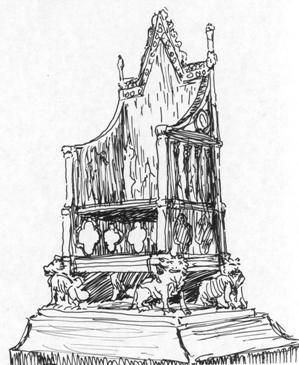
Accomplishing this means enmeshing the adventurers in the political world of the setting, which of course means there needs to be a political component to the setting first. I didn't really grasp this until I was in college, so it started appearing in my games in the mid-Eighties; the relationship between a planetary government and the Imperium in my Traveller games began taking on some nuance and balkanized worlds became my favorite planets for adventure, frex.
Kingmaker provided a lot of inspiration for introducing politics into my roleplaying gaming. Power is gained through control of offices of the state and church, not just nobles and men-at-arms in the field; if one's faction does not possess the sole prince, then one needs to crown a pretender and gain seats in the houses of Lords and Commons or one may be quickly isolated and overwhelmed when Parliament is summoned.
The key idea here is that one's ability to exert influence in the setting must extend further than the point on one's sword or lance, so gaining political power means gaining entry to and mastery of the institutions of state. In a fantasy roleplaying game, this means giving the adventurers the opportunity to join something, to climb a hierarchy other than the experience points table, to gain titles other than those of one's class. It could be an order of knighthood, a college of wizards, a religious confraternity, the Thieves' Guild, or whatever; as the adventurers gain personal power, they should have the opportunity to gain influence as well. A career spent as the behind-the-scenes mercenary strike force of the Emperor doesn't get you there.
By the time they reach "name level," or whatever level represents the lower reaches of the game-world's main figures of power, they should be enmeshed in the affairs of state, able to enter the halls of power and reasonably expect to pull some of the levers therein.
The situations they confront there should not be readily resolved with swords or spells - at least not always. One should need allies, and one should be someone who is sought for an alliance. This means the referee needs to create, and run, a convincing court with conflicting factions as well as allies and enemies abroad - and if those allies can sometimes be enemies and vice cersa, so much the better. The adventurers graduate from simple power wielders to power brokers, using those levers of power to exhance or diminish the levers pulled by others. A fighter who is also the grandmaster of an order or knights and the governor of a royal fortress controlling a key pass in the mountains or a cleric who is the ecclesiarch of an important temple and the tutor to the prince's heir possess the leverage to affect events out of scale with their stats and abilities.
Once you reach this point, in my opinion, the "historical scope" of the campaign becomes tangible and meaningful to both the players and the adventurers. Can your character become a Warwick, or a Richelieu?
This doesn't preclude the characters from reaching higher by any means. The adventurers in this game can also aspire to be a Timur or an Othman, but they may find that gaining an empire is not the same as holding it. A prince often discovers that there are levers of power out of reach of the throne, so one better gain, and keep, allies. The idea of legacy may become a powerful motivation here: Othman established a great dynasty, while Timur's empire pretty much died with him.
For this type of play, one where the characters control considerable resources by dint of office or commission, counting gold pieces needs to be abstracted.
To borrow an analogy from another board game, you need something like the BRPs - basic resource points, iirc - of Third Reich, a simple means of representing the resources of a city, a realm, or what-have-you, and a mean of converting them into armies or fortresses or school or temples or estates. The ability to give power as well as the mean of gaining it should be important at this level, such as placing a henchman in a key provincial government or an admiralty; rewards should be more than, "Oh, and here's this +1 sword I don't use anymore."
Wednesday, May 1, 2013
Subscribe to:
Posts (Atom)
